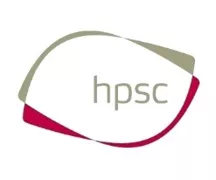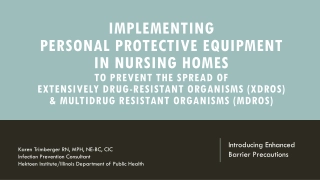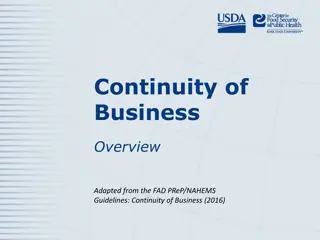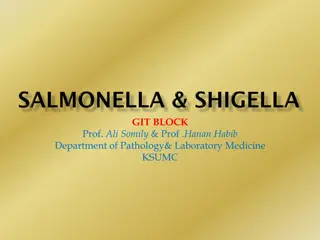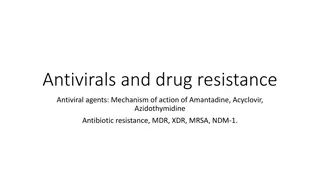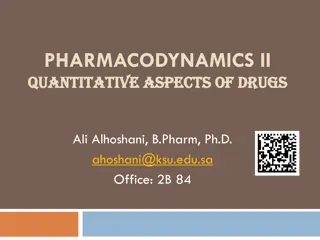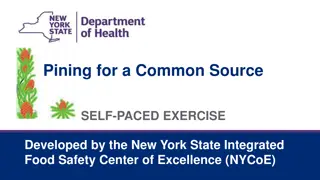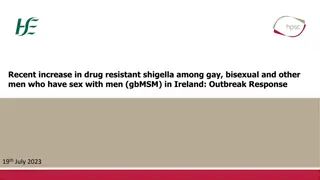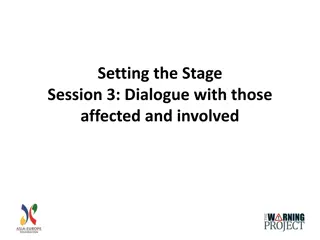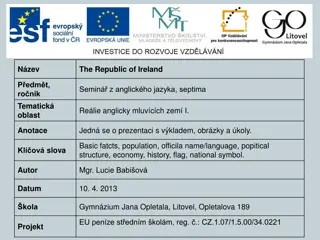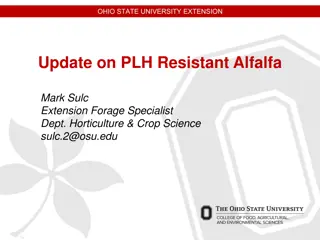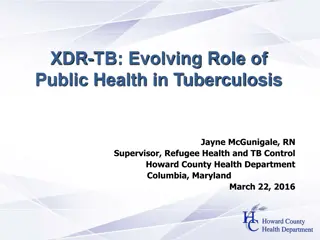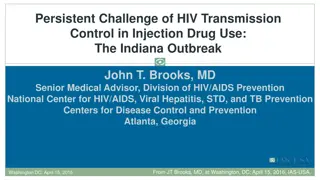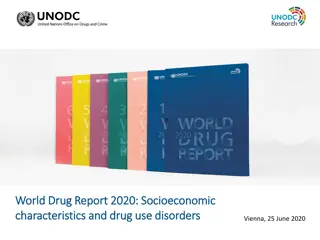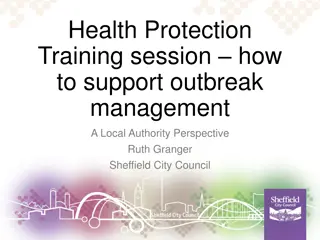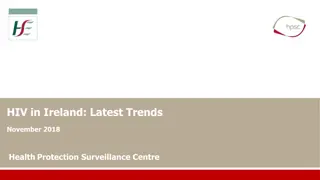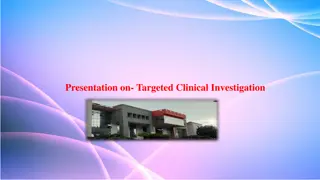Recent Increase in Drug-Resistant Shigella Among gbMSM in Ireland: Outbreak Response
Shigellosis infection, especially among gay, bisexual, and other men who have sex with men (gbMSM), has seen a recent surge in drug-resistant cases in Ireland. An Incident Management Team has been addressing the issue since March 22nd, 2023. This update presents epidemiology and antimicrobial resistance trends up to Week 22, 2023, emphasizing the sexual transmission aspect of the disease.
Download Presentation

Please find below an Image/Link to download the presentation.
The content on the website is provided AS IS for your information and personal use only. It may not be sold, licensed, or shared on other websites without obtaining consent from the author. Download presentation by click this link. If you encounter any issues during the download, it is possible that the publisher has removed the file from their server.
E N D
Presentation Transcript
Recent increase in drug resistant shigella among gay, bisexual and other men who have sex with men (gbMSM) in Ireland: Outbreak Response 19th July 2023
Acknowledgements HPSC would like to thank all those who provided the data for this slide set, particularly the National Salmonella, Shigella and Listeria Reference Laboratory (NSSLRL); STI clinics; General Practice; Other notifying physicians; Other clinical staff; Laboratories and the Departments of Public Health. HPSC would also like to thank all members of the Shigellosis Incident Management Team AMR infection control clinical lead: Eimear Brannigan HIV Ireland/MPOWER: Adam Shanley Area Public Health: Peter Barrett, Anne Sheahan, Gabriel Fitzpatrick, Christopher Carroll, Mary Ward, Fiona Cianci, Christopher Ibanga, Niall Conroy, Sarah Doyle, Mary O Mahony, Mai Mannix, Aine McNamara, Catherine Conlon, Margaret O Sullivan HSE Communications: Anita Butt, Maurice Kelly HPSC: Greg Martin; Mary Archibald, Mark Campbell, Christina Dillon, Martha Neary, Angeline McIntyre, Kate O Donnell, Derval Igoe; Aoife Colgan, Patricia Garvey, Paul McKeown National Clinical Lead, Sexual Health, Medical Director Sexual Health and Crisis Pregnancy Programme: Fiona Lyons National Salmonella Listeriosis and Shigella Reference Laboratory: Martin Cormican, Elaine McGrath, Mark McGuire, Wendy Brennan, Dimitar Nashev, Joanne King, Niall Delappe, Christina Clarke National Clinical Lead, Acute Outbreak Response Programme: Una Fallon 3
Overview Shigellosis infection is transmitted via the faecal-oral route, either through consumption of contaminated food or water or through direct person-to-person spread. Sexual transmission among gay, bisexual and other men who have sex with men (gbMSM) is a key feature of the disease in Ireland and elsewhere. On March 22nd 2023, HPSC issued an alert to Public Health and clinical colleagues to raise awareness of an upsurge in cases, particularly among gbMSM. An Incident Management Team (IMT) which was convened in April 2023 continues to meet on a regular basis. This slide set provides an update on the epidemiology and antimicrobial resistance patterns of shigellosis cases reported up to Week 22 2023. 4
Shigellosis cases by sex and age, 2017-2023 5 Data source: Computerised Infectious Diseases Reporting system (CIDR)
Shigellosis by Sex and Age Week 1-22, 2023 Shigellosis trends by age group, 2017-2023 Average of 28% of cases hospitalised between 2017-2022 6 Data source: Computerised Infectious Diseases Reporting system (CIDR)
Transmission by sex, child/adult and gbMSM status Week 1-22 2017-2023 56 adult male cases 28 (50%) gbMSM 18 (32%) unknown 10 (18%) not gbMSM 7 Data source: Computerised Infectious Diseases Reporting system (CIDR)
Antimicrobial resistant (AMR) shigellosis in Ireland, 2018-2022 Genotypic AMR testing in National Salmonella, Shigella and Listeria Reference Laboratory since 2018 Predicted 3rd generation cephalosporin resistance increasing (12% in 2018 to 36% in 2022) Predicted azithromycin resistance stable (29% in 2018 to 36% in 2022) Predicted quinolone resistance relatively stable (63% in both 2018 and 2022) Isolates displaying resistance determinants to all three classes of antimicrobials increasing (4% in 2018 to 18% in 2022) many also had resistance determinants for trimethoprim/sulfamethoxazole or ampicillin (only 5 resistant to all) 3GC=predicted 3rd generation cephalosporin resistance; AZM=predicted azithromycin resistance; QUIN=predicted quinolone resistance. Resistance is predicted based on the presence of any resistance determinants to the indicated antimicrobial class. 8 Data source: National Salmonella, Shigella and Listeria Reference Laboratory
Four current clusters of concern, 2018-2023 Four clonal groups of concern in 2023 upsurge of cases: S. flexneri: SH19-007 and SH20-004 S. sonnei: SH19-005 and SH22-001 Majority in these clusters are adult males 4 chains of transmission among gbMSM in Ireland (although overlap is possible) SH19-007 is the most extensive chain of transmission The 3 other clonal groups are more associated with antimicrobial resistance to clinically relevant antimicrobials Note: Cluster codes are National Reference Laboratory designations 9 Data source: National Salmonella, Shigella and Listeria Reference Laboratory
S. flexneri SH19-007 by sexual orientation 2019-2023 Summary: 64 cases - all adult males 44 gbMSM 12 unknown 8 not gbMSM Most representatives of this clonal group do not have resistance determinants to ceftriaxone, azithromycin or fluoroquinolones One had a blaCTX-M-14 gene (ESBL) Eight had some resistance determinants for azithromycin Note: Unknown gbMSM status may be because status was not reported on CIDR OR because it was not possible to match CIDR event and Laboratory ID 10 Data source: Computerised Infectious Diseases Reporting system (CIDR) and National Salmonella, Shigella and Listeria Reference Laboratory
S. flexneri SH20-004 by sexual orientation, 2020-2023 Summary: 15 cases - all adult males 9 gbMSM 4 unknown 2 not gbMSM 60% (n=9) have resistance determinants for all 3 of ceftriaxone, azithromycin and fluoroquinolones (CAF resistance) 20% (n=3) for ceftriaxone and fluoroquinolones 20% (n=3) for fluoroquinolones alone Note: Unknown gbMSM status may be because status was not reported on CIDR OR because it was not possible to match CIDR event and Laboratory ID Data source: Computerised Infectious Diseases Reporting system (CIDR) and National Salmonella, Shigella and Listeria Reference Laboratory 11
S. sonnei SH19-005 by sex and sexual orientation, 2018-2023 Summary: 12 cases 3 adult females in 2018/19 associated with travel to USA and South America 9 adult males not associated with international travel 6 gbMSM; 2 unknown, 1 not gbMSM This cluster frequently carries a resistance determinant for fluoroquinolones (qnrB19) No resistance markers for ceftriaxone or azithromycin Note: Unknown gbMSM status may be because status was not reported on CIDR OR because it was not possible to match CIDR event and Laboratory ID Data source: Computerised Infectious Diseases Reporting system (CIDR) and National Salmonella, Shigella and Listeria Reference Laboratory 12
S. sonnei SH22-001 by sexual orientation, 2022-2023 Summary: 6 cases - all adult males 4 gbMSM 2 not gbMSM One case reported international travel to middle east All isolates carry resistance determinants for ceftriaxone and fluoroquinolones No resistance markers for azithromycin Match to international cluster reported in EU and USA Note: Unknown gbMSM status may be because status was not reported on CIDR OR because it was not possible to match CIDR event and Laboratory ID Data source: Computerised Infectious Diseases Reporting system (CIDR) and National Salmonella, Shigella and Listeria Reference Laboratory 13
Response National multisectoral Outbreak Response Team in place Clinicians, Public Health, microbiologists, NGO partners, HSE communications, clinical leads for AMR and Sexual Health, national HIV/STI and gastroenteric and zoonotic disease teams Clinical review of treatment guidance, in light of AMR Risk communication and community engagement Enhanced surveillance, PH guidance for management of shigella in adult males 14
Response: New treatment guidance (22.6.2023) Coordinated by National Clinical leads for Sexual Health, Antimicrobial Resistance and Director of National Salmonella, Shigella and Listeria Reference laboratory Based on AMR surveillance information New treatment recommendations First line treatment for adult males hospitalised with shigella Use carbapenem such as meropenem, pending results on susceptibility to azithromycin, ceftriaxone or fluoroquinolone Non hospitalised adult males with confirmed shigellosis Treat with oral azithromycin 500mg daily for 3 days https://www.hpsc.ie/a-z/gastroenteric/shigellosis/guidancepublications 15
Response: Enhanced surveillance and PH response PH guidance for management of shigella in adult males reviewed and updated Existing surveillance data limited. Decision to enhance surveillance for 6 months on pilot basis, with more detailed sexual exposure information Sexual exposure sex between men? If yes Test for other STIs Check for symptoms in contacts Advice re prevention of transmission and sexual practices (none until 7 days post resolution of symptoms) Available at https://www.hpsc.ie/a- z/gastroenteric/shigellosis/surveillanceforms/ 16
Response: Risk Communication and community engagement gbMSM community partners on outbreak response team Partnership working with Health Service communications team and Public Health. Funding provided for: Targeted communications raising awareness on multiple social media platforms Outreach in venues Presence at PRIDE Article in Gay Community News https://gcn.ie/man2man-campaign-shigella-ireland/ 17
Technical Notes These slides may be copied and reproduced, provided HPSC is acknowledged. Suggested citation: HSE-Health Protection Surveillance Centre. Recent increase in drug resistant shigella among gay, bisexual and other men who have sex with men (gbMSM) in Ireland: Outbreak Response. Dublin: HPSC; 2023. Data were extracted from CIDR on 07/06/2023 and were correct at the time of publication. Data are provisional and subject to ongoing review, validation and update. As a result, figures in this report may differ from previously published figures or figures reported in the future. As this is an ongoing outbreak, data presented on cases and clusters will be subject to further updates. 18








